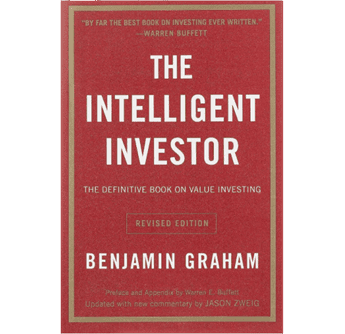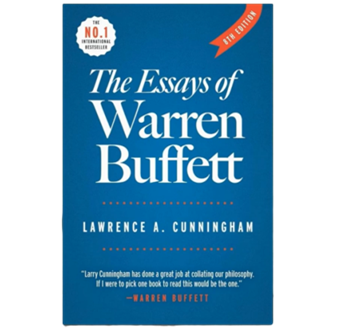
Benjamin Graham, often hailed as the father of value investing, transformed the way investors approach the stock market.
His disciplined methodology, grounded in careful analysis and a focus on intrinsic value, has guided generations of investors, from students in lecture halls to legendary figures like Warren Buffett.
By emphasising rational decision-making, risk management, and a long-term perspective, Graham established principles that remain essential in modern investing.
This article explores his life, philosophy, investment methods, and enduring legacy, providing a comprehensive look at the man who reshaped financial markets.
Benjamin Graham's Early Life: From Humble Beginnings to Wall Street Legend
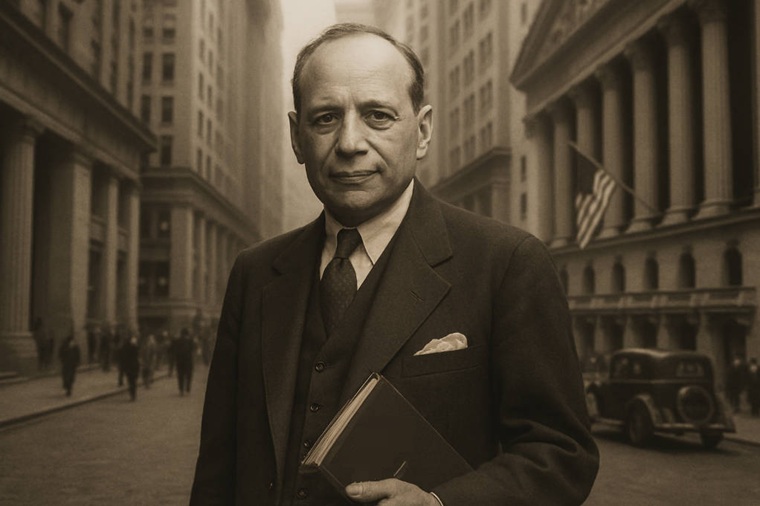
Early Life – A Story of Resilience
Benjamin Graham was born Benjamin Grossbaum in London in 1894 and emigrated to the United States at the age of one.
Following the death of his father, Graham assumed financial responsibility for his family. These early hardships instilled resilience, discipline, and an acute awareness of financial realities, shaping his conservative approach to investing.
Academic Brilliance – Laying the Groundwork
Graham excelled academically, graduating second in his class at Columbia University in 1914. He chose Wall Street over academia, applying his intellectual rigor to practical finance. This decision set the stage for his pioneering contributions to investment analysis and security valuation.
First Forays into Investing
Graham's early career on Wall Street exposed him to market fluctuations and risk management. He learned to analyse securities carefully, observe market cycles, and develop principles that would later form the core of his value investing philosophy.
Benjamin Graham's Investment Philosophy: Rationality and Discipline
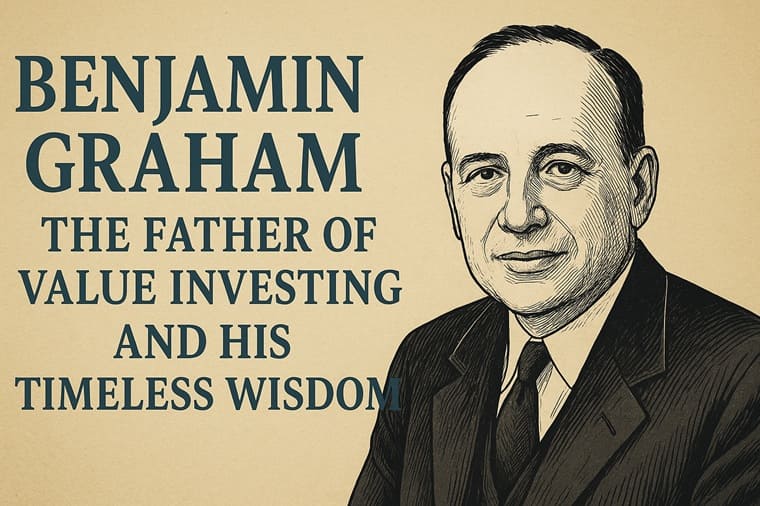
Core Principles – Rationality Over Emotion
Central to Benjamin Graham's approach is the principle of rationality. He emphasised analysing the intrinsic value of a company rather than reacting to stock price movements. This distinction between price and value remains a cornerstone of value investing.
Margin of Safety – Graham's Risk Shield
Graham introduced the "margin of safety" principle, advocating for the purchase of securities at prices substantially below their intrinsic value.
This buffer protects investors from miscalculations and market volatility and is considered Graham's most important contribution to risk management.
Mr. Market – Understanding Market Psychology
In The Intelligent Investor (1949), Graham introduced the allegory of Mr. Market to illustrate market volatility.
Mr. Market's mood swings do not always reflect the fundamental value of securities, and Graham encouraged investors to exploit these fluctuations rationally, rather than succumb to them emotionally.
Defensive vs. Enterprising Investor
Graham distinguished between defensive and enterprising investors.
The defensive investor prioritises safety, steady returns, and diversification, while the enterprising investor engages in detailed research to find undervalued opportunities. Both approaches rely on analysis, patience, and long-term perspective.
The Benjamin Graham Method: Structured and Disciplined Investing
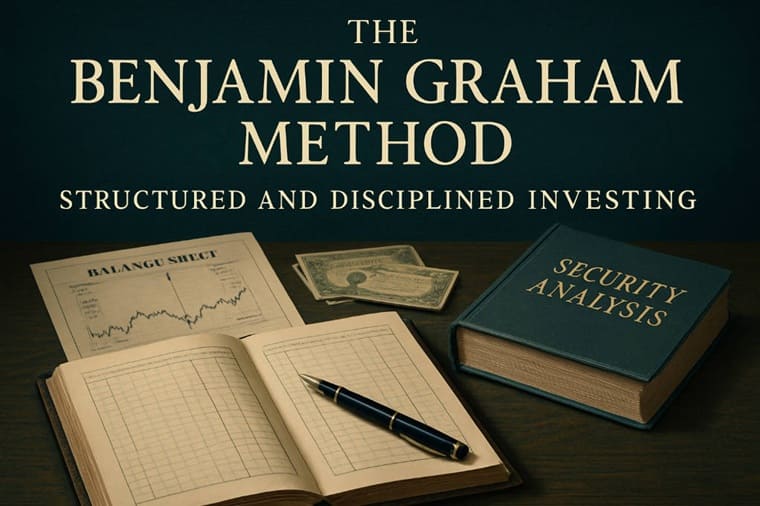
Analysing Companies – Numbers Tell the Story
The Benjamin Graham Method emphasises a rigorous analysis of balance sheets, earnings, and financial ratios. By focusing on fundamentals, investors can identify undervalued securities and avoid speculative risks.
Investment Vehicles – Stocks, Bonds, and Diversification
Graham recommended blending equities and bonds to manage risk. He also stressed the importance of seeking undervalued or overlooked securities for higher potential returns with minimal risk.
Seminal Works – Graham's Written Legacy
Graham authored several seminal works codifying his investment principles. Security Analysis (1934), co-authored with David Dodd, provides a detailed methodology for evaluating securities.
The Intelligent Investor (1949) introduces concepts such as Mr. Market and margin of safety, remaining highly influential for investors today.
Benjamin Graham as a Teacher and Mentor: Shaping Generations
Mentorship – Influencing Future Investors
Graham served as a professor at Columbia Business School, mentoring numerous students, including Warren Buffett. He instilled ethics, analytical rigor, and discipline, helping to shape the next generation of value investors.
Philosophical Influence – Beyond the Stock Market
Graham's principles extend to personal finance and corporate strategy. His focus on rationality, patience, and risk management encourages informed decision-making in all financial matters.
Enduring Global Impact
Benjamin Graham's ideas underpin modern portfolio theory, fundamental analysis, and many professional investment strategies. Decades after his death in 1976. his teachings remain relevant, guiding investors seeking to navigate markets with prudence and clarity.
Frequently Asked Questions About Benjamin Graham
1. What is Benjamin Graham's value investing approach?
Graham advocated purchasing securities below their intrinsic value to provide a margin of safety, minimising risk while maximising long-term returns.
2. How did Benjamin Graham's early life shape his investing principles?
Experiencing financial hardship instilled discipline, frugality, and a keen ability to identify undervalued opportunities—traits central to his investment philosophy.
3. What is the relevance of "Mr. Market" in Benjamin Graham's teachings?
Mr. Market demonstrates the market's emotional volatility. Understanding this concept allows investors to make rational, informed decisions rather than reacting emotionally.
4. Why is Benjamin Graham considered the father of value investing?
Graham formalised a systematic approach to analysing securities, emphasising intrinsic value, margin of safety, and disciplined decision-making. His teachings laid the foundation for modern investing.
Conclusion
Benjamin Graham's life and work exemplify the power of rational, disciplined investing. Through fundamental analysis, risk management, and emotional detachment, Graham created a framework that continues to guide investors worldwide. His principles remain essential for anyone seeking to navigate financial markets successfully and with confidence.
Disclaimer: This material is for general information purposes only and is not intended as (and should not be considered to be) financial, investment or other advice on which reliance should be placed. No opinion given in the material constitutes a recommendation by EBC or the author that any particular investment, security, transaction or investment strategy is suitable for any specific person.














